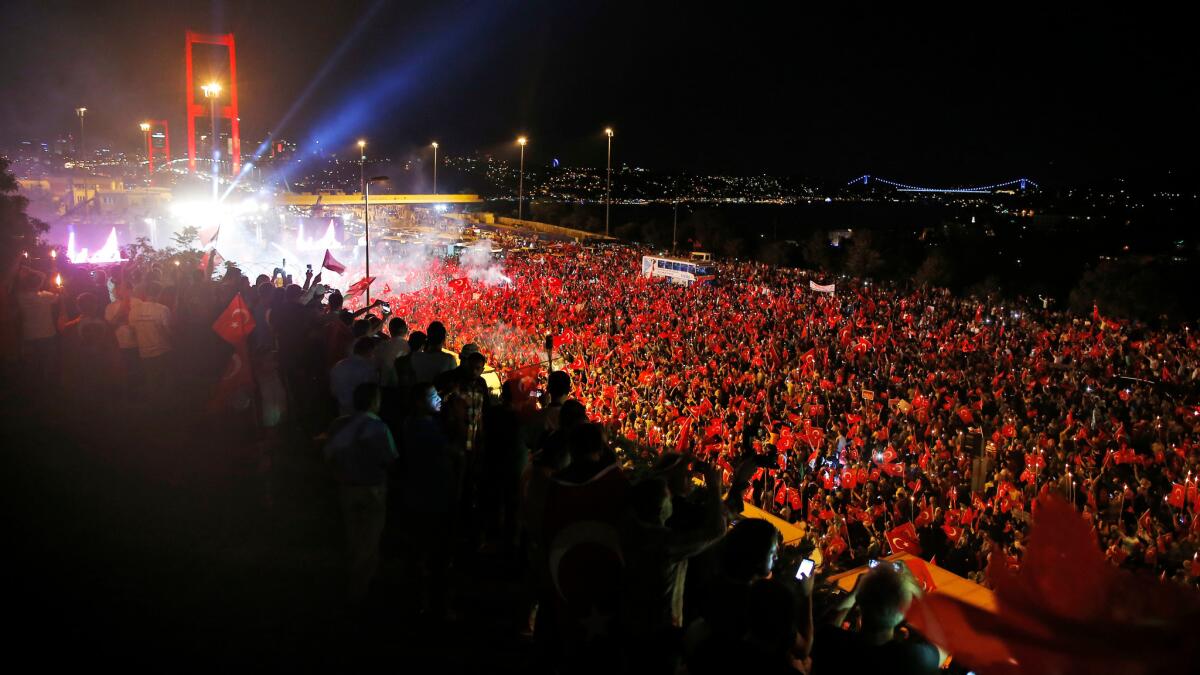Op-Ed: Turkey coup attempt: How did Erdogan, and his party, escape the fate of their predecessors?

The recent coup attempt in Turkey came as a complete surprise to most observers. But a decade ago, the only surprise would have been the fact that it didn’t succeed. After all, in the last 60 years Turkey has had four coups led by a military famously committed to secularism. When the Islamist Justice and Development Party, or AKP, was elected in 2002, another coup seemed all too likely.
Having survived, the AKP’s authority now appears unchallenged; President Recep Tayyip Erdogan is taking no risks as he purges the military of any potentially disloyal officers who remain. How did Erdogan and his party escape the fate of their predecessors?
To be clear, the AKP did encounter real opposition as it consolidated control. High-ranking military officers discussed plans for ousting the party during its first two years in power. In 2007, the chief of the general staff issued a memorandum on the military’s website reminding the AKP of the military’s ongoing commitment to secularism. Subsequently, the country’s head prosecutor began proceedings to formally disband the party for anti-secular activities. The case was heard in Turkey’s supreme court, where it was defeated by a single vote.
But all these efforts only make it more curious that the military did not take decisive action to overthrow the AKP. Indeed, when the AKP put a number of military officers on trial for a fictitious coup plot called the Ergenekon conspiracy, the military brass never went further in their protests than staging a mass resignation.
Perhaps the most obvious reason for military leaders’ otherwise surprising passivity is that they realized they would get no support from the Turkish population. In 1980, many citizens welcomed a military coup as an escape from growing political anarchy. In 1997, the military mobilized civil society organizations and the bureaucracy in support of its effort, which ultimately compelled the government’s resignation without an explicit show of force.
In 2003, when high-ranking military officers were first debating how to handle the AKP’s victory, they were acutely aware that, unlike in the past, they did not have the public on their side. Indeed, leaked documents suggest that the military considered waging a public-relations campaign against the government — with large-scale rallies and critical websites — instead of putting tanks on the street.
The public’s opposition to military meddling stemmed from their experience of the past and their hopes for the future.
The AKP government has now declared a state of emergency, a measure previously imposed by the military in the wake of successful coups.
For many of Erdogan’s pious supporters, rejecting the heavy-handed form of secularism the military had imposed after the 1997 coup was a motivation in itself. But the trauma of past coups also lived on among many of Erdogan’s critics, leaving its mark on Turkey’s opposition parties as well. After the 1980 coup, the military had arrested, tortured and sometimes executed individuals from across Turkey’s ideological spectrum, including leftists associated with the Republican People’s Party, ultranationalists associated with the Nationalist Action Party and Kurds associated with the Peoples’ Democratic Party.
What’s more, in the early 2000s, European Union membership still seemed like a real possibility, and to many in the country and abroad Turkey appeared poised to make the leap from a “democratizing” and “developing” country to a democratic and developed one. Turkey’s generals and its population realized that another coup would make this transformation impossible.
As a result, at every stage in the AKP’s rise to power, the military’s tentative efforts to influence politics backfired, providing a rallying point for Erdogan to expand his base of support. In 2007, the military’s memorandum about secularism preceded, and many believe prompted, the AKP’s resounding victory at the polls several months later. And even as it became more clear that the evidence presented against the military in the Ergenekon trials was fraudulent, the trials remained popular among both liberals and Islamists, for whom defanging the military by any means was the priority.
Before the most recent coup attempt, the government was already quick to suggest that all of its domestic enemies, including secular journalists, Kurdish politicians and followers of the preacher Fethullah Gulen, were acting together in a vast conspiracy against it. The uprising proved that a conspiracy did exist, but that it was less extensive than Erdogan feared. Opposition parties and opposition media that had borne the brunt of Erdogan’s authoritarianism nonetheless stood with him against the plotters.
The AKP government has now declared a state of emergency, a measure the military had imposed after previous coups. Over the last several decades, the Turkish military’s behavior has discredited coups in the eyes of the Turkish people.
The risk now is that, in the coming years, Erdogan’s behavior will discredit the idea of civilian rule as well.
Nick Danforth is a senior policy analyst at the Bipartisan Policy Center.
Follow the Opinion section on Twitter @latimesopinion and Facebook
More to Read
A cure for the common opinion
Get thought-provoking perspectives with our weekly newsletter.
You may occasionally receive promotional content from the Los Angeles Times.










